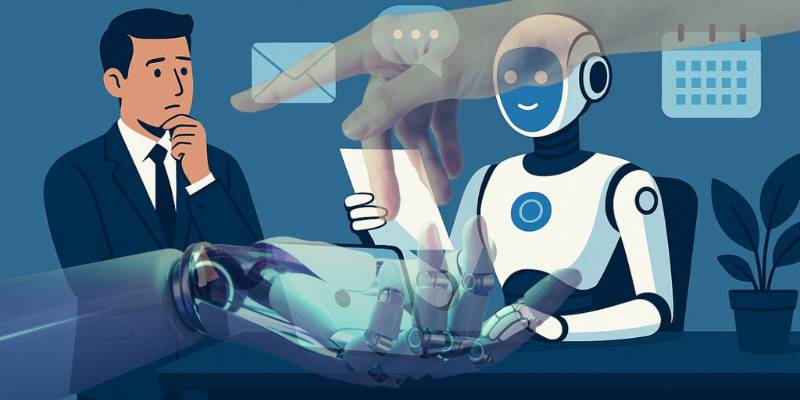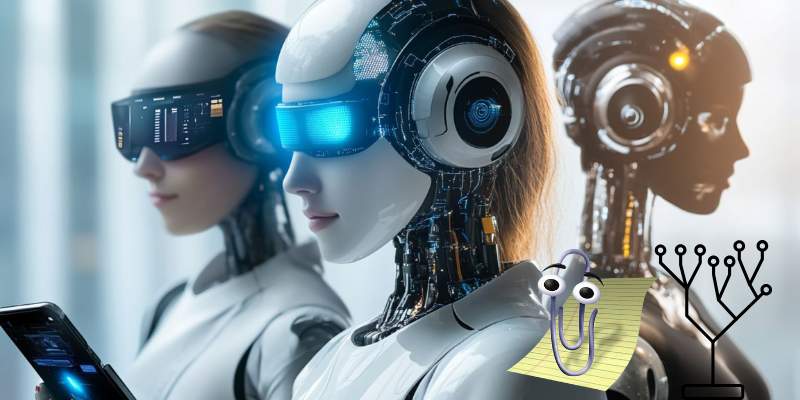It’s a question I’ve heard whispered in hallways, asked nervously over coffee, and debated heatedly in executive meetings: Can AI really replace personal secretaries?
At first glance, the idea feels almost absurd. Secretaries—or executive assistants, as many prefer to be called—are not just schedulers. They’re confidants, organizers, protectors of time, and often the quiet glue holding companies together.
But then you see an AI tool draft a perfect calendar invite, automatically summarize a 30-minute meeting into bullet points, or anticipate scheduling conflicts before you even notice them, and you can’t help but wonder.
This article is exactly what the title promises: a deep dive into efficiency versus human touch in the age of AI assistants. It’s not a sterile technical breakdown. It’s personal. It’s reflective. And yes, it’s messy at times—because the truth is, the future of work is messy.
Chapter 1: The Secretary’s Role—More Than Meets the Eye
Before we can even begin to ask whether AI can replace secretaries, we need to ask: what exactly does a secretary do?
Sure, there’s the obvious: managing calendars, answering calls, filing expense reports, booking travel. But talk to any executive about their assistant, and you’ll quickly realize the job is far more nuanced.
A great secretary isn’t just handling logistics—they’re managing emotions. They know when their boss is too tired to take another call.
They remember birthdays and family events. They craft polite but firm responses to awkward requests. They often act as a gatekeeper, balancing relationships delicately.
That’s not a job description you can hand to an algorithm. Or can you?
Chapter 2: Efficiency—The Machine Advantage
AI assistants have already proven themselves in areas of pure efficiency.
- They don’t forget.
- They don’t sleep.
- They don’t need sick days or vacations.
A study by Deloitte suggested that businesses adopting AI for administrative tasks saw a 30–40% reduction in time spent on routine operations. That’s massive. Imagine reclaiming hours each week because your AI handled scheduling conflicts, email sorting, and meeting transcriptions automatically.
For leaders managing intense workloads, AI promises freedom from constant micro-decisions. Instead of sweating over logistics, they can focus on strategy.
But efficiency alone doesn’t answer the question. Because humans aren’t robots—we live and work in the gray areas, where feelings and subtlety matter just as much as time saved.
Chapter 3: Human Touch—The Irreplaceable Ingredient
Here’s where I get opinionated. I’ve seen AI do incredible things. I’ve watched it write fluid emails, generate convincing memos, even handle tricky back-and-forth scheduling with fewer errors than I’d make on my best day.
But here’s what it can’t do:
- Notice when you’re unusually quiet and ask if you’re okay.
- Remind you gently that today would have been your father’s birthday, so maybe clear some space.
- Use humor to defuse tension after a heated client call.
The human touch isn’t just a “nice to have.” It’s the difference between feeling supported and feeling managed. And personal secretaries excel at weaving empathy into every logistical task.
That’s why I believe AI can supplement secretaries, but replacing them outright? That feels reductive, even dehumanizing.
Chapter 4: Breaking Down The Battle of AI Assistants
Of course, the corporate world isn’t waiting around to answer these questions philosophically. Tech giants are already in an arms race, breaking down The Battle of AI Assistants with each product launch.
- Microsoft has Copilot, integrated seamlessly into Office tools.
- Google offers Duet AI, weaving intelligence into Gmail and Docs.
- Amazon keeps pushing Alexa’s workplace integration.
- OpenAI’s ChatGPT is now being built into enterprise systems directly.
Each one markets itself as the ultimate productivity booster. Each one claims to reduce administrative drag. And behind all of this? Billions of dollars in potential market share.
But here’s the irony: the fiercer this battle gets, the more it highlights what AI assistants don’t yet do. The more companies try to “sell” efficiency, the more glaringly obvious the human element becomes in comparison.
Chapter 5: Questions Around The Rise of Voice-First AI Assistants
We also need to talk about the questions around The Rise of Voice-First AI Assistants.
Voice-first technology is where things get truly interesting. Talking is more natural than typing, and assistants like Siri, Alexa, and Google Assistant have already conditioned us to expect conversational interaction. In offices, voice-first AI can:
- Dictate and transcribe notes in real time.
- Schedule meetings as you’re walking down the hall.
- Provide reminders or updates without you lifting a finger.
This feels futuristic—and sometimes, unnervingly so. Because when your AI is always listening, always ready to jump in, the boundary between tool and companion starts to blur.
And that blurring is exactly what unsettles many secretaries. Not because they can’t compete with efficiency, but because the very idea of being replaced by a “voice” that lacks humanity feels dismissive of the relational heart of their work.
Chapter 6: Understanding Privacy Concerns Trends
Convenience has a dark side, though. And it’s impossible to explore AI assistants without understanding Privacy Concerns trends.
Every voice command, every meeting transcription, every calendar sync—it’s data. Sensitive data. And that raises tough questions:
- Who owns this data?
- How is it stored?
- Could it be sold, shared, or hacked?
According to a 2023 Pew Research survey, 72% of Americans worry about how their personal information is used by AI systems. And honestly, I share that worry.
Imagine your AI secretary is transcribing a confidential board meeting. What if those notes are leaked? What if sensitive negotiations are accidentally exposed to a vendor’s algorithm? This isn’t paranoia. It’s a very real, very present challenge.
Human secretaries, of course, can also leak information—but they operate within trusted relationships, accountability, and context. Machines operate in opaque clouds of data pipelines. Trust feels different here.
Chapter 7: Questions Around How AI Assistants Are Changing Customer Service Forever
Another ripple effect worth considering? The questions around How AI Assistants Are Changing Customer Service Forever.
Customer service has always been a space where efficiency collides with empathy. AI chatbots now handle massive volumes of queries, from resetting passwords to tracking packages.
In fact, IBM reports that businesses using AI in customer service saw a 30% decrease in call volume to human agents.
That’s great for cost savings. But ask anyone who’s screamed at a chatbot after getting stuck in a loop, and you’ll know why human touch still matters.
The workplace secretary role may not be customer-facing, but the lesson is clear: AI handles scale, humans handle care. If companies forget that balance, they risk alienating the very people they’re trying to serve—whether they’re clients, employees, or executives.
Chapter 8: Real-Life Scenarios—What Works, What Doesn’t
Let’s make this tangible.
Scenario 1: Scheduling
AI wins. It can compare calendars instantly, resolve conflicts, and send invites in seconds. A human assistant might take longer.
Scenario 2: Sensitive Communication
Human wins. Crafting a message that politely declines an offer without burning bridges? That takes emotional intelligence.
Scenario 3: Crisis Management
Humans again. When a family emergency strikes and schedules need to shift with compassion, AI doesn’t know how to offer comfort.
Scenario 4: Routine Data Entry
AI wins by a landslide. Who really wants to file receipts or update spreadsheets manually anymore?
These scenarios make one thing clear: the future isn’t about replacement, but partnership. AI should take the mechanical weight, while humans keep the relational core.
Chapter 9: The Emotional Undercurrent
I won’t sugarcoat it—many secretaries feel threatened by this wave of technology. And I empathize with that deeply. When society starts treating your role as “replaceable,” it cuts at identity and dignity.
But I also feel hope. Because what if this is an opportunity? If AI frees assistants from the drudgery of expense reports and endless scheduling, maybe it allows them to expand into higher-value roles: strategy, project management, team culture.
That’s the potential upside. It doesn’t erase the fear, but it reframes it. Instead of asking, “Will AI replace me?” perhaps the better question is, “How can AI empower me to do even more meaningful work?”
Chapter 10: Safeguards and Solutions
If we want AI to serve as a partner, not a threat, companies need to be intentional.
- Transparency: Be clear about what data AI assistants collect and how it’s used.
- Training: Offer reskilling programs so assistants can move into more strategic roles.
- Hybrid Models: Don’t eliminate human secretaries—pair them with AI tools for maximum impact.
- Ethical Frameworks: Establish guardrails around bias, accountability, and fairness.
This isn’t a passive evolution. It’s an active choice. And organizations that prioritize humanity alongside efficiency will come out stronger.
Conclusion
So, can AI replace personal secretaries?
My answer: not fully, and not well. Machines excel at efficiency, but efficiency alone is not enough. Secretaries bring empathy, nuance, and relational intelligence that no algorithm can replicate.
The most powerful workplaces of the future won’t choose between AI and humans—they’ll combine them. AI will handle the repetitive, the predictable, the mechanical. Humans will handle the emotional, the relational, the subtle.
And maybe, just maybe, this isn’t about replacing secretaries at all. Maybe it’s about reimagining what their role could become in a world where the tedious is automated, and the deeply human becomes the most valuable skill of all.


